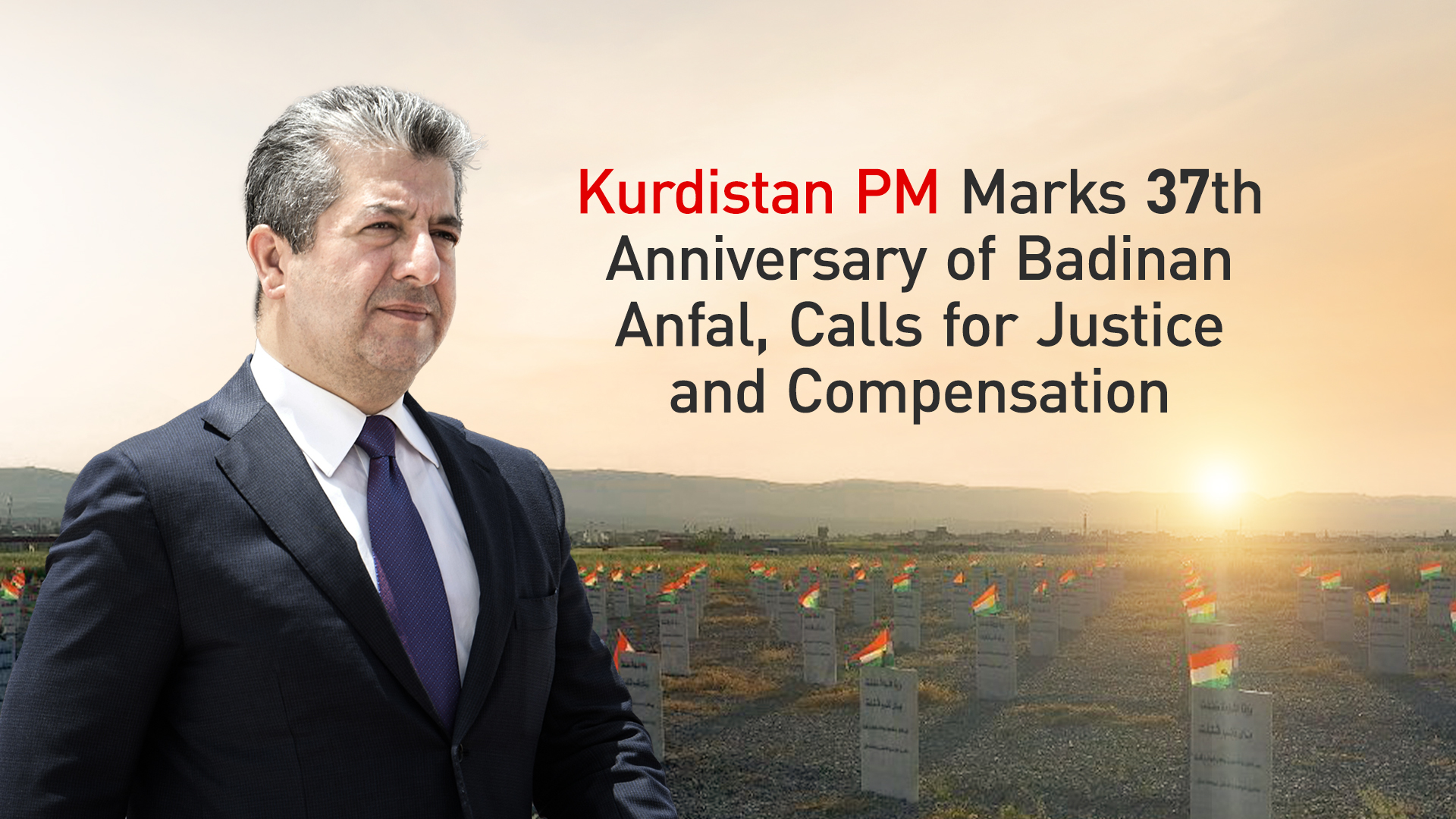Kurdistan PM Marks 37th Anniversary of Badinan Anfal, Calls for Justice and Compensation
Remembering one of the darkest chapters of Saddam Hussein’s Anfal genocide, PM Masrour Barzani urges Baghdad to deliver long-denied justice, reparations, and recognition to the families of victims in Badinan and across Kurdistan.

ERBIL (Kurdistan24) — Kurdistan Region Prime Minister Masrour Barzani on Monday marked the 37th anniversary of the Anfal genocide campaign in Badinan, calling on the federal government in Baghdad to compensate the victims’ families.
“On the 37th anniversary of the Anfal genocide campaign in Badinan, we remember the victims of this brutal crime by the former Iraqi regime,” Barzani said in a statement posted on his official X account. “The federal government must compensate their families. We honor the memory of martyrs of the Anfal genocide and all martyrs of Kurdistan.”
The Badinan phase of the Anfal campaign was one of the deadliest chapters of the Ba’athist regime’s systematic campaign against the Kurdish population. Thousands of men, women, and children were rounded up in the mountainous districts of Duhok Province in 1988, many of them executed or disappeared, while entire villages were destroyed. Survivors were left displaced, with the social fabric of Kurdish life in the region permanently scarred.
On the 37th anniversary of the Anfal genocide campaign in Badinan, we remember the victims of this brutal crime by the former Iraqi regime.
— Masrour Barzani (@masrourbarzani) August 25, 2025
The federal government must compensate their families.
We honor the memory of martyrs of the Anfal genocide and all martyrs of Kurdistan.
The Anfal Campaigns: A Brutal Chapter in Kurdish History
The Anfal campaigns, orchestrated by Saddam Hussein’s Ba’ath regime between 1987 and 1989, were a systematic series of military operations targeting the Kurdish population in northern Iraq. Named after a Quranic term, “Anfal,” meaning “spoils of war,” the campaign was intended to justify mass violence against civilians under the guise of national security.
The campaigns combined ground assaults, aerial bombardments, mass executions, forced disappearances, and the widespread use of chemical weapons. Human rights organizations and international observers have documented that up to 182,000 Kurds were killed, with thousands of villages destroyed and survivors deported to detention camps in southern Iraq.
The Badinan phase, launched in August 1988, came in the final months of the Iran-Iraq War. Security forces encircled villages, separated men and boys from their families, and transported them to execution sites or mass graves. Women, children, and the elderly were forcibly displaced to harsh detention centers. Many perished due to inhumane conditions, hunger, and disease.
The most infamous atrocity linked to the Anfal was the Halabja chemical attack in March 1988, when Iraqi jets dropped poison gas on the Kurdish city, killing around 5,000 civilians in a single day and leaving thousands with lifelong injuries. Halabja became a symbol of Saddam’s brutality and remains one of the starkest examples of chemical warfare against civilians in modern history.
International Recognition of Anfal as Genocide
Over the years, the Anfal atrocities have been increasingly recognized as acts of genocide by both Iraqi courts and the international community. In 2007, the Iraqi Supreme Court formally declared Anfal to be genocide, crimes against humanity, and war crimes.
Globally, several parliaments and governments have echoed this recognition:
- The European Parliament in 2008 passed a resolution acknowledging the Anfal operations as genocide.
- The Swedish Parliament (2012), the UK Parliament (2013), and the Norwegian Parliament (2015) also officially recognized Anfal as genocide.
- In 2016, the Canadian Parliament passed a unanimous motion recognizing the crimes as genocide against the Kurds.
Human rights organizations, including Human Rights Watch and Amnesty International, have long documented the atrocities, describing them as one of the gravest crimes of the 20th century committed by a state against its own population.
Kurdish leaders continue to demand that Baghdad fully implement reparations, rebuild destroyed communities, and provide justice to survivors and families of victims. For the Kurdistan Region, commemorating the Anfal genocide is both a solemn tribute to the martyrs and a continuing call for justice, accountability, and guarantees that such crimes will never be repeated.
